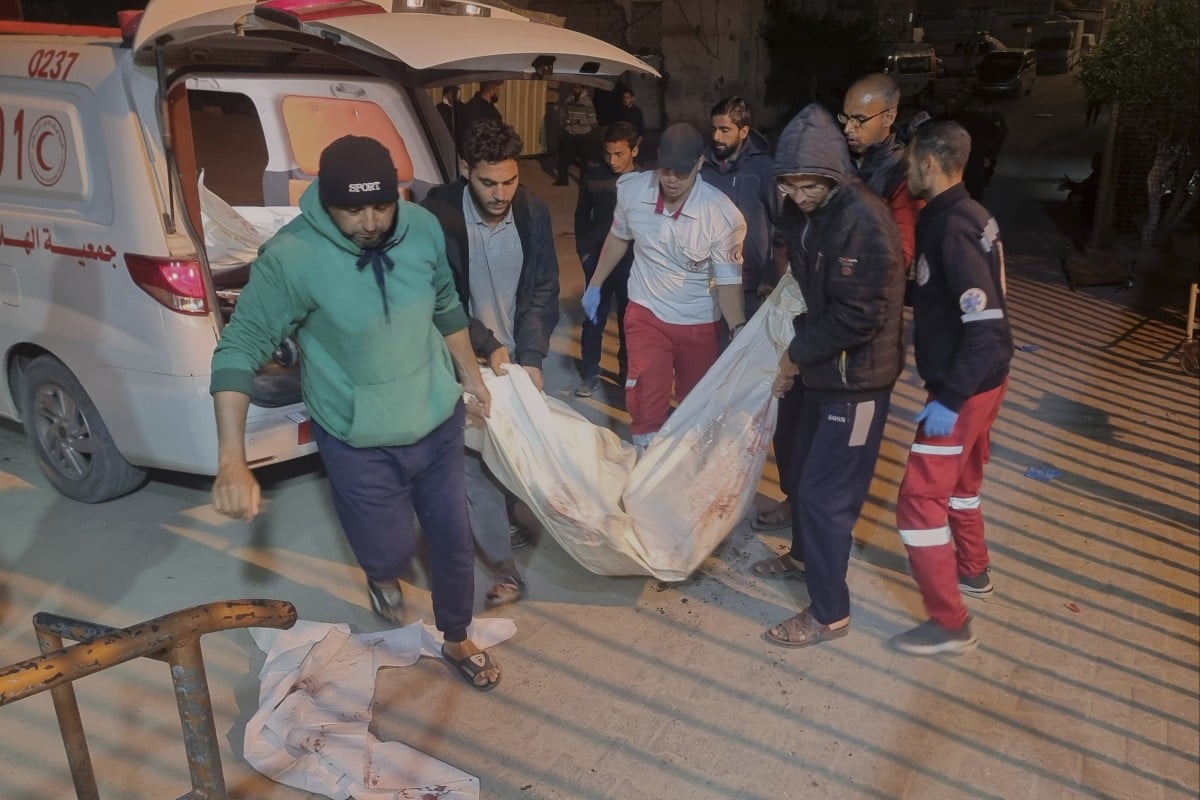
Israel launches intense air strikes on Gaza, killing at least 200 after truce talks stall
Attack shatters a period of relative calm during the Muslim holy month of Ramadan and raises the prospect of a full return to fighting
 Israel launched a series of airstrikes on Gaza, killing at least 200 people, after talks to extend the ceasefire stalled. Photo: AP
Israel launched a series of airstrikes on Gaza, killing at least 200 people, after talks to extend the ceasefire stalled. Photo: APIsrael launched a series of air strikes across the Gaza Strip early Tuesday in its most intense assault on the territory since a ceasefire began in January.
Palestinian officials reported that at least 200 people have died as a result of the strikes.
Prime Minister Benjamin Netanyahu said he ordered the strikes because of a lack of progress in talks to extend the ceasefire. Officials said the operation was open-ended and was expected to expand. The White House said it had been consulted and voiced support for Israel’s actions.
“Israel will, from now on, act against Hamas with increasing military strength,” Netanyahu’s office said.
The surprise attack shattered a period of relative calm during the Muslim holy month of Ramadan and raised the prospect of a full return to fighting in a 17-month war that has killed tens of thousands of Palestinians and caused widespread destruction across Gaza. It also raised questions about the fate of the roughly two dozen Israeli hostages held by Hamas who are believed to still be alive.
Hamas accused Netanyahu of upending the ceasefire agreement and exposing the hostages “to an unknown fate”. In a statement, it called on mediators to hold Israel “fully responsible for violating and overturning the agreement”.
The strikes came as Netanyahu comes under mounting domestic pressure, with mass protests planned over his handling of the hostage crisis and his decision to fire the head of Israel’s internal security agency.
Trump’s isolationist turn threatens Ukraine in war with Russia
Wounded stream into Gaza hospitals
In the southern city of Khan Younis, ambulances brought wounded people to Nasser Hospital, where patients lay on the floor, some screaming. A young boy sat with a bandage around his head as a health worker checked for more injuries, a young girl cried as her bloody arm was bandaged.
A strike on a home in the southern city of Rafah killed 17 members of one family, including at least 12 women and children, according to the European Hospital, which received the bodies. The dead included five children, their parents, and another father and his three children, according to hospital records.
Many Palestinians said they had expected a return to war when talks over the second phase of the ceasefire did not begin as scheduled in early February. Israel instead embraced an alternative proposal and cut off all shipments of food, fuel and other aid to the territory’s two million Palestinians to try to pressure Hamas to accept it.
Explosions could be heard throughout Gaza.
Khalil Degran, a spokesman for the Health Ministry based at the Al-Aqsa Martyrs Hospital in central Gaza, said at least 200 people had been killed. The territory’s civil defence agency said its crews were having a difficult time carrying out rescue efforts because various areas were being targeted simultaneously.
United States backs Israel
The White House sought to blame Hamas for the renewed fighting.
US envoy Steve Witkoff, who has been leading mediation efforts along with Egypt and Qatar, had earlier warned that Hamas must release living hostages immediately “or pay a severe price”.
An Israeli official, speaking on condition of anonymity to discuss the unfolding operation, said Israel was striking Hamas’ military, leaders and infrastructure and planned to expand the operation beyond air attacks.
The official accused Hamas of attempting to rebuild and plan new attacks. Hamas militants and security forces quickly returned to the streets in recent weeks after the ceasefire went into effect.
Stall in talks
The strikes came two months after a ceasefire was reached to pause the war. Over six weeks, Hamas released 25 Israeli hostages and the bodies of eight more in exchange for nearly 2,000 Palestinian prisoners in a first phase of the ceasefire.
But since that ceasefire ended two weeks ago, the sides have not been able to agree on a way forward with a second phase aimed at releasing the 59 remaining hostages, 35 of whom are believed to be dead, and ending the war altogether.
Hamas has demanded an end to the war and full withdrawal of Israeli troops in exchange for the release of the remaining hostages. Israel says it will not end the war until it destroys Hamas’ governing and military capabilities and frees all hostages.
Taher Nunu, a Hamas official, criticised the Israeli attacks.
“The international community faces a moral test: either it allows the return of the crimes committed by the occupation army or it enforces a commitment to ending the aggression and war against innocent people in Gaza,” he said.
Afghan Americans terrified after Trump halts refugee programme
Netanyahu faces mounting criticism
The return to fighting could also worsen fissures inside Israel. Many of the hostages released by Hamas returned emaciated and malnourished, putting heavy pressure on the government to extend the ceasefire.
The released hostages have repeatedly implored the government to press ahead with the ceasefire to return all remaining hostages, and tens of thousands of Israelis have taken part in mass demonstrations calling for a ceasefire and return of all hostages.
Mass demonstrations are planned following Netanyahu’s announcement that he wants to fire the head of Israel’s internal security agency, the Shin Bet. Critics have lambasted the move as an attempt by Netanyahu to divert blame for his government’s failures in the October 7 attack and handling of the war.